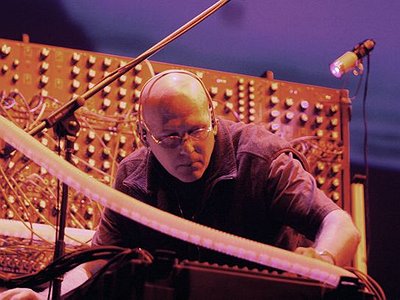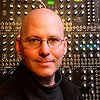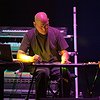Numb to sublety
In how much, do you feel, are creative decisions shaped by cultural differences – and in how much, vice versa, is the perception of sound influenced by cultural differences?
Certainly, culture plays a role in the way we listen and the decisions we make in the creative process. To a certain extent, culture consists of sets of habits and expectations, and every artist must decide upon which habits to reinforce in order to create a comprehensible experience, and which habits to undermine in order to evoke novelty. Yet we mustn’t forget the common language of being alive on a planet, an organism, a mammal, homo sapiens.
This common language of existence helps us to bridge culture and communicate ideas that may have more lasting impact than pure cultural relativism might propose. For example, on my album Bestiary I tried to create a musical language that could have come from another species, another planet perhaps, yet still might express the universal qualities of being alive. Likewise on Temple of the Invisible I wanted to invent the musical language of a fictional human culture in the past, something that could have formed from a common Indo-European ancestry, yet still expressing a universal human condition. Ironically, rather than resulting in a fictional-sounding experience, I came to feel that that album expressed some of my most personal hermetic inner places: sometimes in the act of writing fiction we manage to uncover truths about ourselves that a factual biography could never expose.
The relationship between music and other forms of art – painting, video art and cinema most importantly - has become increasingly important. How do you see this relationship yourself and in how far, do you feel, does music relate to other senses than hearing alone?
This may need a two-part answer. First: I find myself doing work for film increasingly often, and I enjoy this work. The merging of different media opens up all sorts of new possibilities for expression. However, I feel that music with image must serve different needs. It tends to take a supporting role, and cannot be too engaging or it will intrude upon the seamlessness of the experience. Also, I have always enjoyed making light sculptures to go along with my live performances, and I think the audience enjoys the blend of image with sound.
Second: I believe that as a society, we are becoming numb to more subtle forms of expression, as we come to expect everything to be fully engulfing and immersive, feeding an increasingly reflexive form of experience. I wanted to say passive experience, but with gaming becoming so prevalent, the problem isn’t so much passivity as it is mechanical, mindless, repetitive engagement in a fully artificial sensorium.
As our man-made world gets louder, we become increasingly deaf to quiet textures of existence that might feed our consciousness a little better. Many forms of art can excel on their own, to clear away some of the chaos and help us find footing again and locate our centre of gravity. Take for example the sculptures of Richard Serra or Andy Goldsworthy, which can heighten our relationship with landscape. I am interested in this possible expression of music also, but I don’t see that happening as effectively in a multi-media vortex of sensory input.
There seem to be two fundamental tendencies in music today: On the one hand, a move towards complete virtualisation, where tracks and albums are merely released as digital files. And, on the other, an even closer union between music, artwork, packaging and physical presentation. Where do you stand between these poles?
Although I have a foot firmly on each raft, I expect to fall into the water between them soon, as they each float away. I still cling to the object a little bit. I like creating art. I like a beautiful package. I like to hold something in my hand. I do feel that the virtualization of music has removed it one step further from the human experience. Yet that seems consistent with the increasing abstraction of modern culture. I have tried making a few collectible art-box things, and they certainly were not a good financial investment. It’s swimming upstream, for sure.
I completely sympathise with the environmental arguments that we don’t need to create more landfill and plastic garbage. I suppose one could argue that most music collectors cherish their LPs and CDs longer than the portable media players which people constantly need to upgrade. I understand both viewpoints.
Perhaps the question of music distribution formats misses an interesting change in the music listening experience. Recorded music has already moved very far away from the founding essence of music: as humans participating in communal ritual, as medicine, storytelling, tribal bonding or rites of passage. As we virtualize music to the next step of unreality – to the solipsistic experience of a person in headphones isolating themselves in a bubble from the rest of the world – then we have taken a tool for bonding communities and transformed it into a tool for isolating individuals from the community. I am not so worried about the format for distribution that recorded music takes in the future – whether as an object or as pure data. I am more interested in learning how to retain or reinforce the aspects of music that connect listeners to their world and communities, rather than isolate them.
The role of an artist is always subject to change. What's your view on the (e.g. political/social/creative) tasks of artists today and how do you try to meet these goals in your work?
I think my personality tends to make me better at asking long term questions, rather than focusing on political or social transformation. I am more inclined to lift up my voice for environmental concerns such as deforestation or climate change, for example. Whatever glimmer of idealism I may still try to keep alive usually gets crushed when I look at the human condition. Perhaps my faith in humanity is too fragile to fuel me in the fight for social justice. Instead I have long believed that one can also help the world by asking meaningful existential questions, to encourage the possibilities of self-reflection; and perhaps I’m such an idealist and a romantic that I still sometimes believe there is a role for beauty in art.








